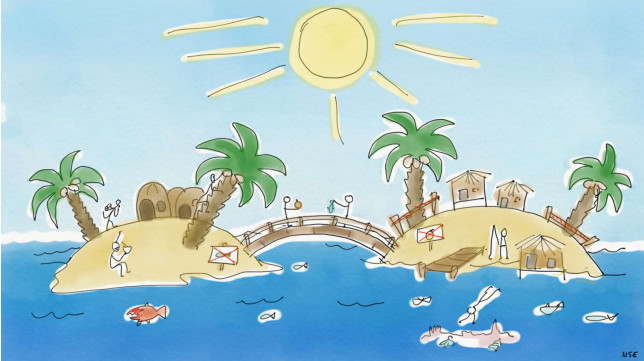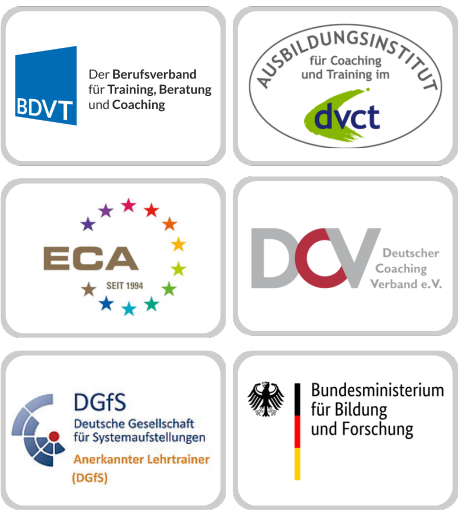A Bakhtinian Perspective on Coaching
Abschlussarbeit von Nina Sueße, als PDF lesen
Proposition 1: Reality is an island
Each and everyone of us has a unique life. In that life, we make experiences. Some of those experiences are very unique. Other experiences we share with many people, for example a first day at school, or the daily commute on the bus. What makes our collection of experiences individual is not (just) which experience we make, but also the sequence in which we make them.
As one of many scientists, Bourdieu1 suggests that early experiences (e.g. in childhood) are the most important experiences we make, because they build the foundation of our understanding of reality, upon which all later experiences are built.
To put this into a simple story:
Imagine a group of people living on an island. The island is covered by coconut palms, out of which the people make all they need for living. Their diet is based on coconut. Every child grows up to appreciate how important and wonderful coconuts are.
But one time – lo and behold – somebody from the island stepped into the water of the surrounding ocean, and was bitten by a fish! The children grow up with that story, and are warned away from the water: It’s dangerous!
On another island nearby, people get all they need to live from the ocean, and they love the ocean very much. But once – lo and behold – somebody walked under a coconut palm, and was hit by one of those dangerous fruit! Ever since, people warn each other to stay away from the palms.
Each island has made different experiences, and these shape the islanders’ understanding of reality and how they act upon that understanding in everyday life.
Now imagine somebody builds a bridge to connect the islands, and during the grand opening ceremony people from both islands will meet for the first time. To make a good impression, each party brings a gift that is meaningful to them, something symbolic – for instance a coconut or a fish…
We can imagine how a misunderstanding might happen on that bridge when gifts are being exchanged. A key source of conflict in our daily lives is built on the assumption that what is good and sensible on “our island of reality” is equally good and sensible for other people on their islands. But the more diverse our pre-experiences are, the more likely we are to construct reality differently and misunderstand each other.
Systemic coaching addresses this issue in two ways:
• First, in the aƫtude of the coach to support the coachee in finding their own way around their own island – and not to impose the coaches’ understanding of reality.
• Secondly, systemic questions gently direct the coachee’s attention towards a change of perspective.
For example, circular questions ask for the perspectives of other people in the social system of the coachee.
In a subtle way, this allows the coachee to draw on the constructivist aƫtude lived by the coach as a resource to examine their own construction of reality from different angles.
Proposition 2: Managed expectations pave the road to collaboration
A branch of scholarship situated between sociology, political science and linguistics is founded on the work of Mikhail Bakhtin and evolved around the idea of dialogism2. One person says or does something, another reacts. Then the first reacts to the reaction. More people can be involved. There is a back and forth motion in the dialogue, in which earlier interactions lay the foundation for further interactions.
What was said first has an impact on what can be said second3.
Over time, common patterns of responses (“How was your day?” “Good. How was yours?”) become habitual. They generate expectations of what (usually) comes next. This is simply a process of learning from experience, and developing expectations based upon that experience. In that way, experiencecan be seen as our constructions of the (imminent) past, and expectations are our construction of the (imminent) future4.
We consider processes as stable, if our experience of what just happened is similar or identical to what we expected. Conversely, we notice change as a mismatch of our experience and expectations. Change forces us to reconsider our expectations, which means the same as to say: change forces us to question our understanding of reality.
Something is new, unaccounted for. It does not fit the world as we knew it.
Example: Team Development & Feedback
From a leadership perspective, guiding one’s team in a time of change implies a need to set new collective expectations. It requires expectation management. This is a collective learning process of determining who does what when, and which clues (“Let’s do a team meeting”) lead to which actions for whom (“I’ll set up the video conference” / “I’ll get the numbers to present”). Effective teams can reduce alignment time by establishing a team culture of routines and mutual understandings. Therein, expectations can become subconscious patterns that guide everyday interaction effortlessly.
Conversely, if teams seeks to (continuously) improve their patterns of collaboration, it is helpful to “gently disrupt” these habits by feedback rounds (What did go well, what did not? What do we want to keep, what do we want to change?).
Through regular feedback, we can pick up new impulses from each other and exchange perspectives to come to a shared understanding of reality (e.g. our team targets, roles, and processes). This shared understanding (or “team island”, team language, team culture) helps to orient and organize collaboration together.
Island Example: Feedback / Expectation Management
If – as a coconut islander – we have learned to appreciate a bit of fish once in a while, we could add a fish monger to our island to establish trade with our neighbour island and have access to fresh fish.
Expectation management could here imply seƫng up a system of communicating demand and supply quantities for fish and coconuts, so that fishers and coconut farmers know how much of their goods to deliver to the other island. For example, one could organize a weekly market.
(!) Market prices, from an economist’s perspective, are primarily a feedback system to regulate supply and demand.
Application: Coaching
From the idea that everybody has their own “island of reality” follows that we need to take into account that what we intend to say and how that message is received are two separate things. One consequence in the coaching process is that we might try to communicate more carefully, and seek feedback on our conversation partner’s understanding of what we said more often. It also implies judging very carefully (or not at all) and taking a critical distance to our own values and habits – being more conscious and open to the diversity of reality constructions out there.
As coach, we offer this “island idea” of constructivism to our coachees with the intention to help. Solution-oriented applications of a constructivist aƫtude are conflicts (interpersonal and inner), decisions or changes of aƫtude the coachee may want to achieve. Fundamental to any personal development is the change in a coachee’s perception of reality – creating alternative ways of seeing things – creating new ways of acting upon those things. Hereby the coachee consciously manages their own expectations.
Quellen bis hierher
1 Bourdieu, P. (1977) Outline of a Theory of Practice. Cambridge University Press: Cambridge.
2 Bakhtin developed a theory of culture that is based on the idea of dialogue and meaning as socially emergent, evolutionary in “moving beyond what is given”. Academic fields such as Conversation Analysis or Linguistic Ethnography, as well as cultural studies around subjectivity discuss similar issues. The following simplified explanation is based on my apprehension
of these sources, found in full in my doctoral dissertation. Fulltext link: https://kclpure.kcl.ac.uk/portal/en/theses/caught-between-the-clocks(2b72b5ea3917-486e-a453-46ae84e07dce).html
3 Utterance 1 impacts utterance 2, but it does not determine what utterance 2 can be
4 The past of what we already made sense of (experienced) – wether a year ago or a second ago – in contrast to expectations (anticipations, imagination) or the future








